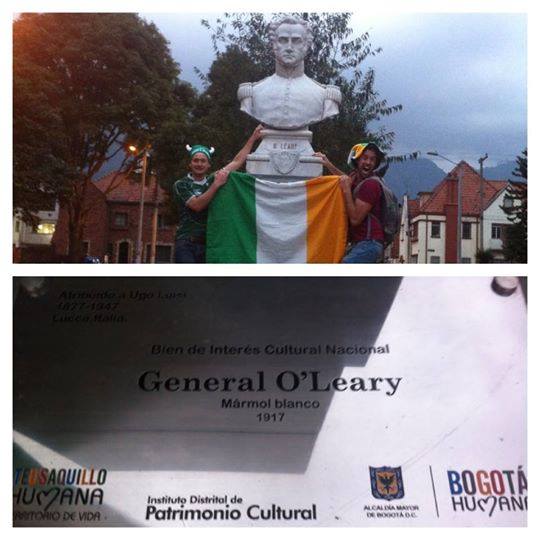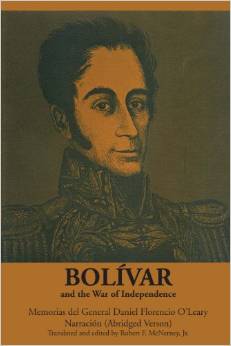Ingresa o regístrate acá para seguir este blog.
@radiobrendan
It’s fairly well known that the Irish are migrants. Coming from a small island, yet at the same time close to a host of the world’s old superpowers, it was pretty much inevitable that we’d wander outside our shores to see ‘what’s out there’.

Our Irish-Colombian hero! General Daniel Florence O’Leary. (Photo by Pieter Hupkes.)
Indeed in the early days of Ireland’s human history, its inhabitants took on the role of travellers with gusto, regularly raiding the neighbouring island of Britain. Subsequent generations would pay a hefty price for such daring. But before total British interference, in our early Christian days, our brightest and best traversed the European continent in what you might call an Irish-Christian educational enlightenment.
Subjugation to our English neighbours didn’t change that; the only difference was that emigration wasn’t seen as a choice for many, but more of a necessity. It meant the masses went on the move, rather than just the ‘privileged’ few. And for most of those early movers to the ‘New Worlds’, leaving the homeland didn’t guarantee any great improvement in conditions. It would be a few generations down the line before those of Irish descent started being treated as equals with their ‘superiors’.
However, some of those who left did find instant success. Or at least had a big influence in their new abodes.
In South America, that tended to manifest itself in the military sphere. For one, you had Admiral William Brown, the County Mayo man regarded as the father of the Argentinian navy; on the other side of the Andes, there was Bernardo O’Higgins, Chile’s founding father and the bastard child of a County Sligo man. The signs of that Irish interaction, and others, can be seen today in street names and the like across Argentina and Chile.
Yet one place where the Gaels didn’t seem, at least I had thought, to leave a mark was in the north of South America. OK, a few Irish lads had a recent, less than positive run-in with Colombian officialdom in the early part of this century, but that was about the height of links between Ireland and the land that is now called the Republic of Colombia I’d known about.

Important: O’Leary’s memoirs have given historians a nice insight into the life of Simón Bolívar. (Image from amazon.com.)
‘There’s always one’, though, and that more positive association comes in the face of a Mr Daniel Florence O’Leary. The County Cork-born general was an aide-de-camp under the great ‘liberator’ (that’s a loaded title) from Spanish rule of these parts, Simón Bolívar.
In his later years, as an historian and diplomat, he wrote important memoirs documenting what was a landmark period in South American history. He also played a part in securing Venezuelan independence from what had been Gran Colombia.
In between all that, he found the time to father nine children; that might help to explain the odd few ginger-haired Colombians knocking about.* (Now while this writer hopes to leave a positive mark on Colombia, replicating the reproductive exploits of O’Leary isn’t part of that; not right now anyway.)
It’s fair to say that he doesn’t get the same recognition in Colombia as his aforementioned contemporaries in Argentina and Chile — perhaps for valid reasons — but there is, at least, a bust honouring him in a Bogotá city park.** He did, after all, breathe his last breaths here, as well as leaving a decent gene legacy. (For the record, his remains lie in Venezuela’s National Pantheon.)
That’s something the rest of us Irish in Colombia, 127 at the last official count, will do well to emulate. Perhaps in time, though, a bust of ‘Wrong Way’ will be erected in La Perseverancia?
________________________________________
*If anyone knows of living descendants of Daniel O’Leary, it would be much appreciated if you could let us know here.
**For those in Bogotá interested in visiting the bust, it is located in Parque Gernika, in the middle of Calle 46 between Carrera 17 and Transversal 16A.
A special thanks to the staff at Bogotá’s Instituto Distrital de Patrimonio Cultural for providing me with valuable information.
Facebook: Wrong Way Corrigan – The Blog.


as you said; leaving home didn’t guarantee any improvement.
“When I look back on my childhood I wonder how I managed to survive at all. it was, of course a miserable childhood, the happy childhood is hardly worth your while. worse than the ordinary miserable childhood is the miserable irish childhood, and worse yet is the miserable irish catholic childhood”
this one was wrote by an irish catholic writer; in “Angela’s ashes”. and its not so far away from reality; it was the way how they were seen as poorest pariahs, sorry outcasts
- Me gusta
0
- No me gusta
0
ReportarCalifica:
You’re right there Carlos. But we climbed (most of us anyway) our way out of the dirt. Indeed, I see many comparisons between Latinos and Irish in North America. This is something I wrote a while back on the topic … http://bit.ly/1784NCY.
- Me gusta
0
- No me gusta
0
ReportarCalifica: